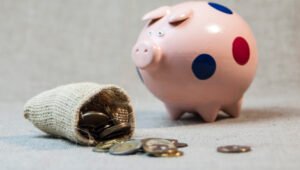Bad habits are one of life’s greatest obstacles. Few things can get in the way of success more than a bad habit.
No one likes dealing with their unhelpful habits. They’re hard to get rid of for a reason. But eliminating detrimental financial habits allows for greater financial freedom and success.
Not all bad habits are created equal. Some are especially damaging:
- Failing to track your spending. When the credit card bill arrives in the mail each month, are you ever surprised? Do you stare at the unopened bill for a while, heart-pounding, while you mentally tally up your purchases for the month?
This is a common habit among those with financial challenges. If your money is important to you, track it.
- Purchasing impulsively. Impulsive buying is purchasing things you didn’t intend on buying when you left the house or turned on your computer. You know you have a challenge with impulsive purchasing when you run to the store for a pair of brown socks and come back with socks, two pairs of shoes, and a leather jacket.
- Determine what you need and then purchase it. This is especially true for larger purchases.
- It’s easy to rationalize in the heat of the moment. Avoid falling into that trap. If you know you’re weak in this situation, be diligent.
- Not taking debt seriously. It’s easy to convince yourself that a $67 payment each month is manageable, and it probably is. However, when that $67 monthly payment continues for 60 months, it adds up to a lot of money.
- Consider how much interest you’re paying.
- Consider how much you could have earned by investing that money instead.
- How long will the item last? It’s not uncommon to still be paying for things that have found their way to the trash.
- Dealing with debt is like riding your bike against a wind that never stops blowing. It continuously takes from you. Avoid accumulating debt.
- Failing to save automatically. The typical mindset works like this: “I’ll pay my bills, live my life, and then I’ll save whatever is left at the end of the month.” You stand a better chance of walking on the moon than making this strategy work.
With this strategy, there’s never anything left over at the end of the month.
- Failing to understand the latte factor. Those little purchases might not seem important, but they quickly add up. That $5 coffee each day is over $1800 each year. That’s enough to take a vacation with your family. How many other small purchases do you make on a regular basis?
Make an honest assessment of how much you spend each year on coffee and these other items. What else could you buy with that money that’s more meaningful to you?
- Cigarettes
- Magazines
- TV Guide
- Newspaper
- Candy bars
- Ice cream / frozen yogurt
- Soda
- Going out to lunch instead of bringing your lunch.
- Paying bills late. Are you habitually late when paying your rent, mortgage, credit cards, or utility bills? Did you know that credit card companies make more money from late payment charges than they do from the high interest rates they charge?
- If you’re consistently late paying your bills, it’s costing you dearly. If you’re late paying your bills, you’re not handling your financial business. This is a sign that you’re likely not handling the other business in your life effectively either.

These are the primary poor habits that lead to financial struggle. If you have one or more of these habits, your financial future is seriously limited. It’s well worth the time and effort to change these habits into positive habits that support your financial goals.
This list isn’t intended to be exhaustive. It’s intended to stimulate your thinking about your own habits that are hurting your financial health and future. You can’t change something if you’re unaware of it.
Make yourself fully aware of your negative financial habits:
- Make a list of your current financial troubles. Examine the following areas:
- Savings
- Income
- Debt
- Retirement
- Spending
- Determine which habits are creating these financial challenges. Think about your spending habits, how you pay your bills, and how you save.
Which of your habits are causing you the most grief?
- Find a replacement behavior. For example, if your poor habit is buying expensive coffee on the way to work, a replacement behavior could be drinking the coffee at work, making coffee at home, or drinking tea instead. Make a list of all the options. Select the option that’s most appealing to you. Consider the cost, hassle, and likelihood of compliance. For example, if the coffee at work is horrible, it’s probably not a viable option.
- Make a commitment for one month. If you can avoid your harmful habit consistently for a month, you’re in great shape. Expect to deal with some negative feelings and impulses during the first 30 days.
- Remind yourself of how great it will be to drop this habit. In the coffee case, imagine how much money you’re saving and what you can do with those funds instead of drinking coffee on the highway.
- Deal with slippage. There’s a good chance you might have a slip or two along the way. Accept that you’re not perfect and resolve to do better tomorrow. Determine what led to your slip-up and find a solution.
- Reward yourself for success. After a month of avoiding your bad habit, reward yourself in some small way. Rewarded behavior is more likely to reoccur.
Poor financial habits can leave you in the poorhouse. Eliminating detrimental financial habits can have a bigger impact on your finances than developing good financial habits. The steps and strategies for changing habits are well-known. Motivation and determination are your contributions to the equation.
“It seems, in fact, as though the second half of a man’s life is made up of nothing but the habits he has accumulated during the first half.
– Fyodor Dostoevsky










